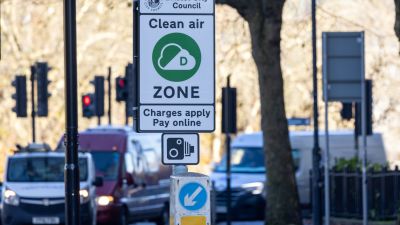Bristol City Council wins only 17 per cent of Clean Air Zone fine appeals

Fewer than one in five motorists who challenge a Clean Air Zone fine from Bristol City Council lose their case if they take it to appeal, new figures have revealed.
Tens of thousands of Clean Air Zone fines have been issued since the scheme went live on the last day of November 2022, but new figures from the Traffic Penalty Tribunal suggest that when motorists appeal against the fines, they are successful more often than not.
Data from the Government’s Traffic Penalty Tribunal shows that the tribunal judges ruled in drivers’ favour in more than half, some 56%, of all appeals.
And of the rest, most were settled with a compromise - usually that the driver should pay the £9 charge, but not the £60 or £120 fine.
The Government’s Traffic Penalty Tribunal is effectively the court of appeal for parking and traffic fines, and is the next step for motorists after they have unsuccessfully appealed to the local authority who issued the fine in the first place.
No concrete figures have been released yet from Bristol City Council about its Clean Air Zone - the authority said it would issue a report when the scheme has been running for 12 months, giving the numbers of fines and the impact the zone has made on air quality and traffic numbers after it has been in place for a year.
But the Traffic Penalty Tribunal has released figures on the numbers of cases which reach its appeals court.
As of Wednesday 16 August, the total number of Clean Air Zone penalty charge notices (PCNs) that have been appealed to the tribunal is 1,106.
Of those, 224 are still awaiting a decision or resolution, but of the 882 that have been decided, only 150 have been refused - with the tribunal judges agreeing with the council that the fines are valid and should be paid.
A total of 500 appeals have been allowed, with the drivers told they don’t need to pay the charge or the fine at all.
And a total which were ‘closed by consent order’ was 232.
These are appeals which are closed before a ruling is needed, usually where the council has agreed with the motorist that they should pay the charge but not the fine.
Included in the 'allowed' category are appeals where the council has withdrawn the fine entirely - which is what happened to four PCNs challenged by a driver from the Bath area, who claims the legal orders enforcing the Clean Air Zone in Bristol are riddled with errors and not legally binding.
The driver, known as Mr L, challenged Bristol City Council on those grounds and the council withdrew his fines rather than go through a Traffic Penalty Tribunal hearing, avoiding a ruling which he said could set a precedent for all the CAZ fines.
Bristol City Council refused to explain why it had withdrawn those fines, and has refused to comment on the TPT’s latest figures.
Of the 882 appeals taken to the tribunal, the tribunal has ruled in the drivers’ favour in 57% of the cases, a compromise agreement has been found in 26% of cases, and the council’s fines have been upheld in just 17% of cases.
Many of the cases where the fines are withdrawn and 'not contested' by the council when they are taken to the TPT relate to cases where vehicle number plates are cloned, or the car recently changed hands and the fine was incurred by the previous owner, or where the driver did pay the CAZ but got the date wrong on the form.
A council spokesperson said: “Those who think they have received a Clean Air Zone PCN in error or have mitigating circumstances can submit an appeal. Each appeal will be assessed based on its own merit.”
A spokesperson for the Traffic Penalty Tribunal said anyone who wants to challenge a Clean Air Zone fine has to first of all appeal to the council itself.
“Anyone receiving a PCN must first challenge it with the local authority (known as ‘making representations’), so the authority has an opportunity to assess the circumstances and evidence at this stage,” he said.
“If the authority rejects representations then a motorist can submit an appeal to the Traffic Penalty Tribunal.
"Please see here for further reference of the CAZ enforcement / appeal process, and you will find comprehensive information on the appeals process elsewhere on our website,” he added.